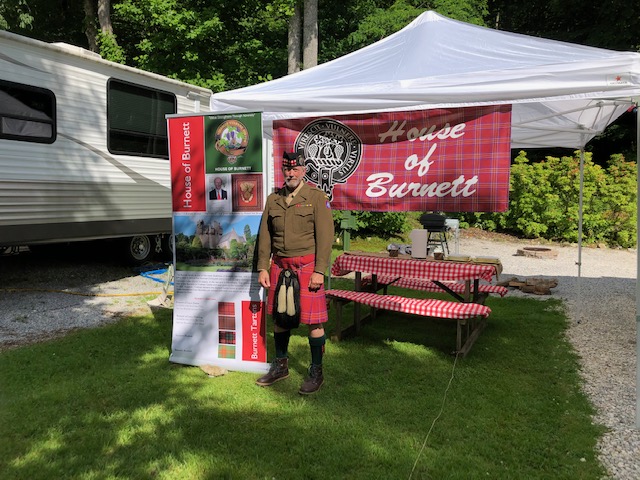
I am most grateful to Terry Burnett for sending me this very moving and detailed account of the life and World War II experiences of of his father Jerry. Nearer to the present day, we must also thank Terry for his contribution to the House of Burnett
Not deterred by the cancellation of the Grandfather Mountain Highland Games. Terry and Sally stoically ventured forth to show the Burnett flag and he sent me this photograph from Newland, North Carolina where they were camping Sally and I are camping and proudly displaying our House of Burnett banners.
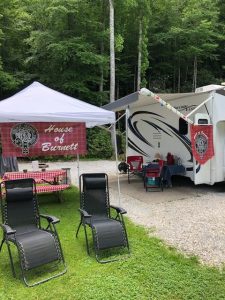
In addition to the most interesting and moving article below, Terry has sent me this photograph, which includes a faithful representation of my father’s “Ike” jacket from WWII. Terry did go to the trouble to recreate essentially all of the original ribbons, pins, patches, etc. that are on the original.
Jerry Burnett was a lieutenant in the 84th Chemical Mortar Battalion in Italy. He won the bronze star on Oct 9, 1944. Terry has his actual jacket but despite losing considerable weight, it is still a wee bit too small for him. So he found one and recreated all of his insignia to honor his father (he passed away in 1978), and his Burnett Scottish heritage. His sporran is a WWII vintage Black Watch and he also has a Gordon Highlander vintage sporran.
The World War II Career of Lt. Jerry I. Burnett
84th Chemical Mortar Battalion, Fifth Army
By Terry Burnett
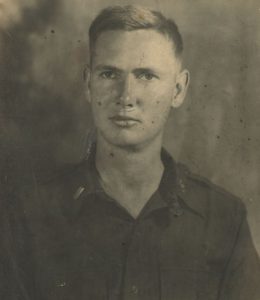
Photo of Lt. Jerry I. Burnett. On the back it reads: To my darling wife, with love always, “Lt. Puddin”
It was the fall of 1944 along the German Gothic Line in Italy. Twenty-four year old 1st Lt. Jerry Burnett was flat on his stomach, crawling along the ground, nauseous with fear. His blind fingers felt numb as he moved back and forth, forward a few feet, sideways a few feet. Making noise of any sort was simply not an option, so the going was agonizingly slow.
He didn’t know if fear made a black night darker, or the cloud-shrouded Italian darkness magnified his fear. All he knew in that terrible moment was that he had been following the radio line from his mortar battalion company field position to a forward observation post when the line came to an abrupt and ragged termination.
Why was the end of the line in his hand and not attached to a radio? Where were his buddies? The darkness was absolute and the silence was like the end of the world. He couldn’t call out. He was technically at the front edge of the American lines and for all he knew, he was surrounded by Germans who might be aiming mausers at his back.
Have you ever been truly alone? Have you ever been completely helpless, with no plan, no escape route to safety? Lt. Burnett was truly alone in that moment. As far as he knew, the forward observation post, to which he had been sent, was wiped out. He had no idea where the other end of the radio line was. All he could do was crawl and hope; feel his way along the ground and pray.
“During the whole War, that was the most afraid I ever was. That was the most afraid I have ever been,” he said when he told me the story.
Jerry Ison Burnett (1921-1978) was my father. He was born in Gadsden, AL, the son of John Watson Burnett and Hazel Ison. His great-uncle, John Lawson Burnett, was a United States Congressman and his 6th great-grandfather was James Burnett, who served in the Virginia Line and was with General George Washington at Valley Forge.
Jerry graduated from the Georgia Military Academy in Atlanta and was the roommate of the son of Kentucky Governor (and future Commissioner of Major League Baseball) Albert “Happy” Chandler. During his time at GMA, the Chandler’s invited him to stay at the Governor’s Mansion and attend the Kentucky Derby. Coincidentally, another house-guest was the famous Hollywood starlet, Lana Turner. Jerry was chosen to escort her to the Derby. I asked him, “What in the world did you say to Lana Turner?” He looked at me a little sheepishly and said, “All I could think of to say was ‘You sure are pretty!’”
After GMA, Jerry attended Alabama Polytechnic Institute, better known now as Auburn University. He was a typical college kid and was once arrested for driving a motorcycle up and down the courthouse steps in nearby Phenix City (a notoriously wild and licentious place in those days). I’m quite sure that “alcohol was involved.”
Jerry was an avid Auburn sports fan. He was close friends with legendary Auburn football coach, Ralph “Shug” Jordan, and when he took me to Auburn games, I got to visit the players in their dorm rooms at Sewell Hall. He once even arranged for my favorite player, Mike Currier, to give me a birthday telephone call when I turned 10. Family rumor also has it that Jerry was responsible for Auburn’s 1957 NCAA Probation, which banned the undefeated team from bowl participation. Auburn was nevertheless voted National Champions that year by the Associate Press. Ohio State won the honor in the UPI Coaches Poll.
Jerry went through Officer Candidate School (OCS) at Auburn and was commissioned a 2nd Lt. in the U.S. Army in the Spring of 1943. He was sent for training in the Chemical Warfare Service (CWS) at Fort Rucker, AL., and before being shipped overseas, married his childhood sweetheart, Dorothy May “Jackie” Morgan at Fort Custer in Battle Creek, Michigan in early August, 1943. He joined his unit, the 84th Chemical Mortar Battalion, at the Anzio Beachhead in the winter of 1944 as part of Mark Clark’s Fifth Army. The unit motto was “Cave Fumo” (Beware the Smoke). The four companies of the 84th were attached as needed to various U.S. infantry units to serve as offensive and defensive support, using their 4.2 mortars with often devastating effect against German attacks and defensive positions. A wartime Stars and Stripes article notes: “During the Anzio action, the 84th was forced to overcome many obstacles never before encountered. Soft ground offered an unstable base for the heavy mortars, defilade was only what the gun crews constructed, observation was poor and traffic was restricted to the hours of darkness. Yet, in spite of these difficulties, foundations were made for weapons, mortars and men were dug in and concealed, and fire often was directed from in front of the outpost line… The battalion supplied vital support in breaking up several Kraut counterattacks and aided materially in the breakthrough at Cisterna.”
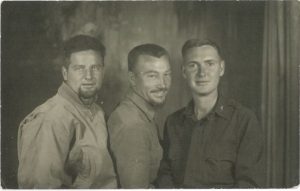
Jerry Burnett with Sgt. John Cody and Sgt. John Boyko, taken June 1944 in Rome
Originally, the 4.2s were designed to fire white phosphorous (WP) shells to serve primarily as smoke screens so U.S. and British infantry and armor could move without harassment toward heavily fortified and entrenched German positions along the Gustav and Gothic Lines. But almost immediately, the mortars evolved their use and began firing high explosive (HE) shells with great effect. Jerry’s hand-written note “My Platoon” on a February 20, 1945 newspaper clipping reads: “A recent front-line action showed why veteran 5th Army troopers love the 4.2 mortar as they do. The muzzle-fed, rifled barreled weapon proved its claim to extreme accuracy when 12 out of 15 of its shells made direct hits on an enemy-held farmhouse at 3500 yards.” That same article notes that the Germans were also highly impressed by the mortars’ range and accuracy, “a fact that is borne out by statements from enemy prisoners, having surrendered with clothes burned away by phosphorous.”
Jerry’s Company C alone fired more than 52,000 rounds during the Italian Campaign.
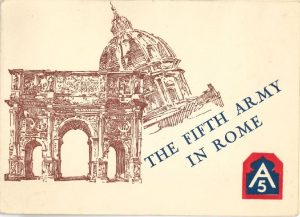
Jerry was present at the Anzio breakout, the liberation of Rome on June 4, and the attack on the German Gothic Line in the summer and fall of 1944. In the summer and early fall of 1944, 2nd Lt. Burnett was recommended for promotion by his C.O., Lt. Col. Forrest E. Love with these words:
“Lt. Burnett had full charge of the First Platoon, Company A, 84th Chemical Battalion, while it was in a defensive position near St. Georgia (sic, San Giorgio), Italy, from 25 July to 29 July 1944. During these days Lt. Burnett directed very accurate fire on large patrols crossing the Arno River. Many of these patrols, attempting to get information as to Allied strength, unit dispositions, and strong points, were completely wiped out as a result of the mortar barrages. Large numbers of prisoners were taken and some heavy German mortars and machine gun positions were destroyed.
Lt. Burnett was again in complete charge of the First Platoon during the absence of the platoon leader from 17 September to 23 September 1944, in the vicinity of Barberino, Italy. During this time he directed mortar fire on the enemy with such skill that the enemy forces in that area had to withdraw from their positions. Our troops were able to move forward into the wedge that the mortar fire had opened before them. As a result our forces were able to gain many points and completely destroy the enemy ranks in that sector. Lt. Burnett, throughout this period, showed outstanding leadership, fine grasp of the tactical situation, and the ability to act fast and effectively in a situation that demanded great courage and military skill.”
Jerry’s promotion to 1st Lt. was effective from Oct. 4, 1944. A mere five days later he again distinguished himself by winning the Bronze Star. The commendation letter, signed by Maj. Gen. Geoffrey Keyes, states:
“For heroic achievement in action on 9 October 1944 near Monzuono, Italy. When a defective shell landed in front of his mortar, causing three casualties and setting fire to nearby ammunition, Lt. Burnett extinguished the fire, which had become an enemy target. The courage shown by him in the performance of this hazardous deed was in the highest traditions of the military service.”
The Italian Campaign was designed to create a southern front and penetrate the “soft underbelly” of Hitler’s Europe. As the Allies discovered, however, Italy was anything but soft. German General Albert Kesselring led a skillful and tenacious defense and despite heroic efforts, the Allies never actually drove the Germans out of the northern Italian mountains. Thus, at the time Allied armies marched into Berlin and the Third Reich capitulated on May 2-3, 1945, German forces were still fighting in Italy.
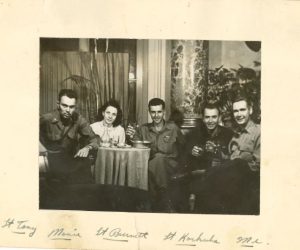
Photo taken in September 1944 at the Fifth Army Officers’ Rest Hotel – Hotel Excelsior in Rome. Jerry Burnett is on the far right, and a Lt. Jerome A. Burnett (Purple Heart) is in the center. Terry is going to try to track him down genealogically.
The 84th (and Jerry’s Company C) finished the War with a brilliant combat record. The unit received several commendations and was universally recognized as making significant contributions in Italy. The Battalion was in combat for 512 days. At the surrender in May 1945, none of the six original Company C officers were left, and only 65 of the original 199 men. Sixteen men had died in battle and seventy-eight had received Purple Hearts.
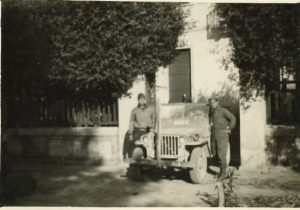
Undated photo of Jerry Burnett (on left) and buddy with a Co. C Jeep with my mother’s name (Jackie) stencilled under the windshield.
The 84th was deactivated in September 1945 and Jerry finally left Italy in November aboard the USS Lake Champlain, an aircraft carrier turned troop transport. Every GI on the ship must have been paddling hard because the Lake Champlain set a transatlantic crossing record of 4 days, 8 hours, 51 minutes that stood until 1952.
After the War, Jerry went rejoined his father’s and grandfather’s family business, BBS Grocery Company in Gadsden, AL. The wholesale grocery supplied local markets with all sorts of products until driven out of business in the late 1960s by the advent of the large grocery chains. Jerry and Jackie had three children – Jerry Ison Burnett, Jr. (“Jerry B”), Dorothy May Burnett (“Didi”) and John Terhune Burnett (“Terry”). Jackie passed away in 1961; Jerry in 1978.
Dad was reticent to discuss his experiences in the War. I was only 19 when he died and did not have much luck persuading him to tell me stories. I asked him about being afraid and he shared with me the story at the beginning of this article. He also shared a story about being on a patrol one night with a buddy and walking up to another soldier in the dark. When they tapped the soldier on the shoulder to ask for a cigarette, the poor fellow dropped his rifle and surrendered – in German. Dad said, “That might have ended much differently if he had known who we were.”
He also told me how horrible the rainy season could be on the mortar troops: Mortar emplacements filled with water, weapons unable to fire, no way to get the mortars in working order. He told me about how, in the rain, his socks would literally rot off his feet. He called it “trench foot.” He talked about being unbearably cold in the winter and unbearably hot in the summer. He showed me the ugly mustard gas burns on his arms inflicted by enemy chemical mortar shells.
One of the interesting stories he shared was about a German officer whom his unit had captured and who stayed in camp with them for several days before being sent to the rear. The officer, who spoke excellent English, said, “You Americans are fighting the wrong enemy. You should be fighting the Russians.” That made an impression on him, and in the 1960s and 1970s many Americans might have agreed with that officer. Coincidentally, he brought that officer’s Walther P-38 and holster home as a War Trophy and I still have it (and it still works perfectly).
The War was not kind to my Dad. His scars went deep. I believe he suffered from what we call today Post-traumatic stress disorder (PTSD). He struggled with alcohol and after BBS failed, with employment. His death at 57 was premature and preventable. He was an imperfect son, father, and husband, but he taught me how to fly fish and to love Auburn. And he was a War Hero. I am proud to be his son and to be a Burnett.
Terry Burnett




